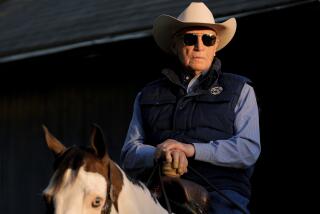Madness in His Methods
- Share via
On the morning after the Kentucky Derby, Wayne Lukas stood in front of his barn at Churchill Downs, basked in the glory of Grindstone’s victory and lashed out at the critics who had been saying that he is more huckster than horseman.
“At some point,” he told reporters, “some of you guys are going to have to say, “They must be doing something right. . . . There must be some horsemanship here.’ ”
Lukas had the last word on the subject until Thursday, when Churchill Downs issued a news release announcing that Grindstone’s career was over because of an injury to his right knee. The colt’s retirement after a six-race career exemplifies the reason that the media and the trainer’s peers view Lukas so negatively, despite all his statistical achievements and his streak of six consecutive victories in Triple Crown events. Good horses under Lukas’s management have had a fearsome casualty rate, especially in the past three years:
Union City broke down in the 1993 Preakness and was destroyed.
Tabasco Cat, winner of the 1994 Preakness and Belmont, was injured after his 3-year-old campaign and never raced at 4.
Flanders broke down while winning the 1994 Breeders’ Cup Juvenile Fillies and never raced again.
Thunder Gulch, winner of the 1995 Kentucky Derby and Belmont, was injured in the fall and retired.
Timber Country won the 1995 Preakness and never raced again.
Hennessy, runner-up in the 1995 Breeders’ Cup Juvenile, was injured and hasn’t raced at age 3.
Golden Attraction won the 2-year-old filly championship of 1995 and was injured; she has not raced since.
And now, Grindstone.
When Lukas is criticized for horses’ breakdowns, he will point out that such misfortunes can befall any thoroughbred and any trainer; they are a regrettable but inescapable part of the game. In the aftermath of Union City’s demise, when many people accused him of running an unfit horse, he angrily countered that he was being unfairly singled out for criticism. “You get one bad break in the game,” he said at the time, “and you guys (the media) want to put it on a billboard sign.”
But Lukas has had so many of these “bad breaks” that it’s difficult to ignore them or their possible connection with Lukas’s approach to the sport. No trainer in the modern history of thoroughbred racing has been so obsessed with winning Triple Crown races, year-end championships and money titles as is Lukas. In his pursuit of these objectives, Lukas almost never displays restraint in the management of individual horses. Words such as “I don’t think this horse is ready yet” may be a cliche for cautious trainers, but they rarely pass Lukas’s lips.
Outsiders have no way of telling whether Lukas knowingly runs horses who are unfit--a subject of much speculation at the racetrack. But we can observe some of the other win-at-all-costs aspects of his training.
In 1994, Tabasco Cat had seemingly completed a long, grueling campaign when he finished second in the Breeders’ Cup Classic. But Lukas was vying with Bill Mott for the money-winning title, and so 15 days after the Breeders’ Cup he threw Tabasco Cat into a stakes races on the turf--a surface over which he had never run. Not only was Tabasco Cat trounced, but he never raced again. In the view of many critics, this was just another case where Lukas’s personal ambitions took precedence over the interests of the horse.
His record of “bad breaks” is now so long that when Grindstone was injured, the instinctive reaction of many skeptics was not sympathy, but cynicism: Lukas has done it again.
The injury to Grindstone was especially regrettable because the Triple Crown series had stimulated some much-needed public interest in the sport. Television ratings were up for the Kentucky Derby, and the breathtaking finish involving Grindstone and Cavonnier had generated considerable anticipation of their Preakness rematch.
Many fans were eager to learn just what kind of a horse Grindstone was. The Derby had been the only important victory of his career, and in it he had been the beneficiary of ideal racing luck: His stretch-running style was helped by a hot early pace, and he received a perfect, ground-saving ride from Jerry Bailey. Nevertheless, he had done this in only the sixth start of his career-making tim one of the least experienced horses ever to win this highly demanding race. He figured to improve considerably as he matured.
But now the game has been deprived of a potential star and an engaging rivalry. We will never know what kind of horse Grindstone might have become--just as we can only speculate about the potential of so many Lukas trainees whose careers ended much too soon.
More to Read
Go beyond the scoreboard
Get the latest on L.A.'s teams in the daily Sports Report newsletter.
You may occasionally receive promotional content from the Los Angeles Times.










